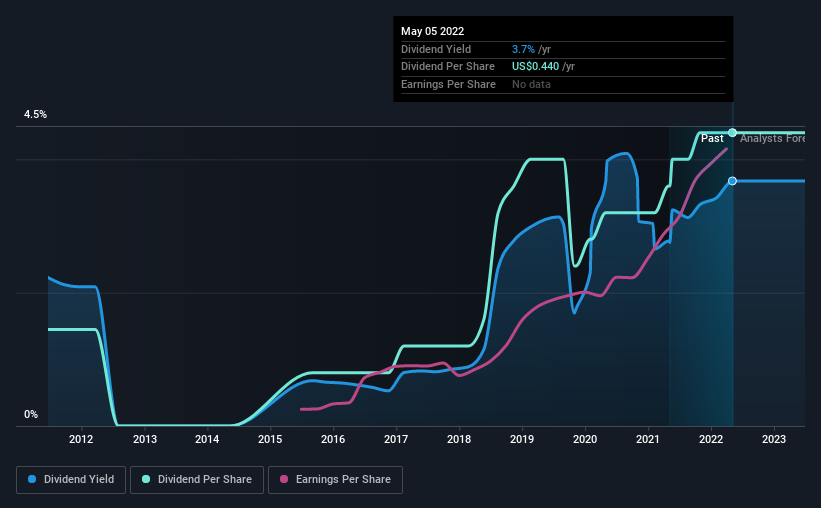Be Sure To Check Out Kearny Financial Corp. (NASDAQ:KRNY) Before It Goes Ex-Dividend
Some investors rely on dividends for growing their wealth, and if you're one of those dividend sleuths, you might be intrigued to know that Kearny Financial Corp. (NASDAQ:KRNY) is about to go ex-dividend in just three days. The ex-dividend date is usually set to be one business day before the record date which is the cut-off date on which you must be present on the company's books as a shareholder in order to receive the dividend. The ex-dividend date is important as the process of settlement involves two full business days. So if you miss that date, you would not show up on the company's books on the record date. This means that investors who purchase Kearny Financial's shares on or after the 10th of May will not receive the dividend, which will be paid on the 25th of May.
The company's next dividend payment will be US$0.11 per share, and in the last 12 months, the company paid a total of US$0.44 per share. Based on the last year's worth of payments, Kearny Financial has a trailing yield of 3.7% on the current stock price of $11.97. We love seeing companies pay a dividend, but it's also important to be sure that laying the golden eggs isn't going to kill our golden goose! As a result, readers should always check whether Kearny Financial has been able to grow its dividends, or if the dividend might be cut.
View our latest analysis for Kearny Financial
Dividends are usually paid out of company profits, so if a company pays out more than it earned then its dividend is usually at greater risk of being cut. That's why it's good to see Kearny Financial paying out a modest 41% of its earnings.
Companies that pay out less in dividends than they earn in profits generally have more sustainable dividends. The lower the payout ratio, the more wiggle room the business has before it could be forced to cut the dividend.
Click here to see the company's payout ratio, plus analyst estimates of its future dividends.
Have Earnings And Dividends Been Growing?
Companies with consistently growing earnings per share generally make the best dividend stocks, as they usually find it easier to grow dividends per share. If business enters a downturn and the dividend is cut, the company could see its value fall precipitously. That's why it's comforting to see Kearny Financial's earnings have been skyrocketing, up 45% per annum for the past five years.
Many investors will assess a company's dividend performance by evaluating how much the dividend payments have changed over time. In the past 10 years, Kearny Financial has increased its dividend at approximately 12% a year on average. It's exciting to see that both earnings and dividends per share have grown rapidly over the past few years.
Final Takeaway
Should investors buy Kearny Financial for the upcoming dividend? Typically, companies that are growing rapidly and paying out a low fraction of earnings are keeping the profits for reinvestment in the business. This strategy can add significant value to shareholders over the long term - as long as it's done without issuing too many new shares. Overall, Kearny Financial looks like a promising dividend stock in this analysis, and we think it would be worth investigating further.
While it's tempting to invest in Kearny Financial for the dividends alone, you should always be mindful of the risks involved. We've identified 2 warning signs with Kearny Financial (at least 1 which is potentially serious), and understanding these should be part of your investment process.
Generally, we wouldn't recommend just buying the first dividend stock you see. Here's a curated list of interesting stocks that are strong dividend payers.
Have feedback on this article? Concerned about the content? Get in touch with us directly. Alternatively, email editorial-team (at) simplywallst.com.
This article by Simply Wall St is general in nature. We provide commentary based on historical data and analyst forecasts only using an unbiased methodology and our articles are not intended to be financial advice. It does not constitute a recommendation to buy or sell any stock, and does not take account of your objectives, or your financial situation. We aim to bring you long-term focused analysis driven by fundamental data. Note that our analysis may not factor in the latest price-sensitive company announcements or qualitative material. Simply Wall St has no position in any stocks mentioned.

